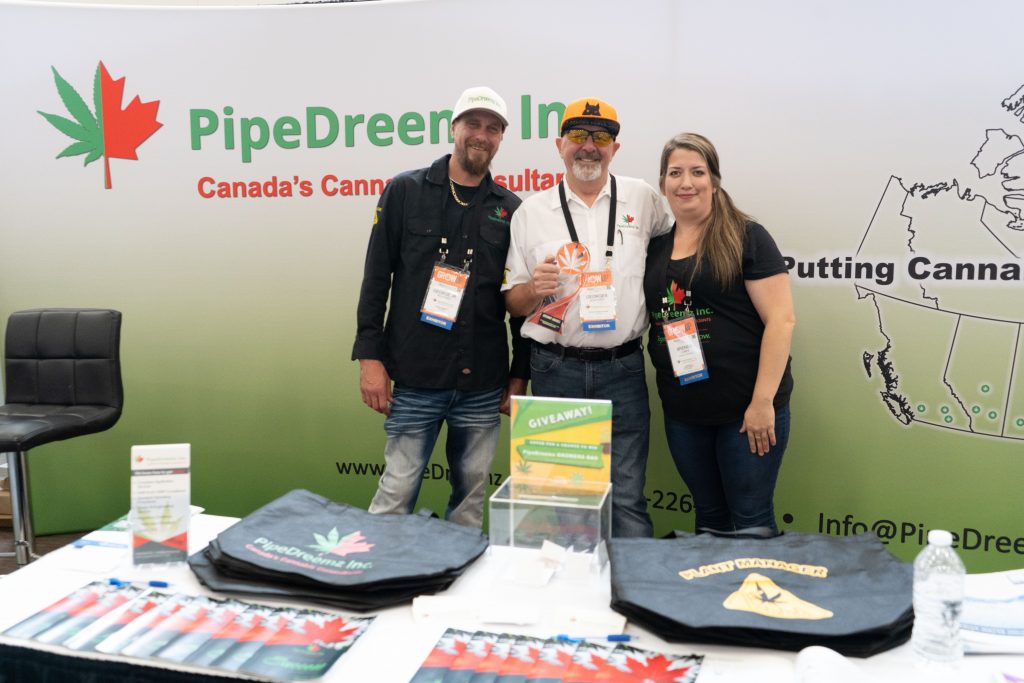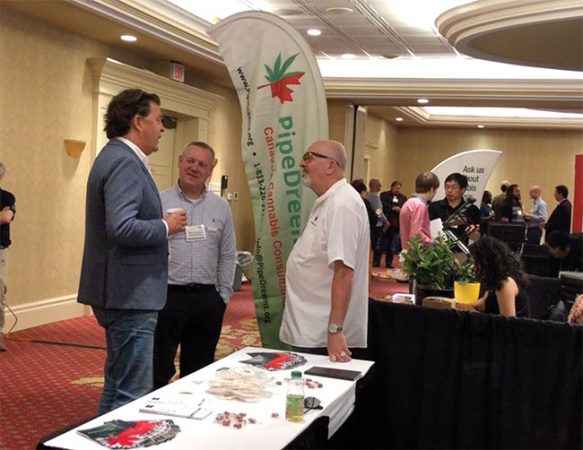
Features
Business
Management
Medical
Living the pipe dream
Q&A with Georges Routhier, CEO, PipeDreemz Inc.
September 13, 2019 By Mari-Len De Guzman
 CEO Georges Routhier (centre) recently accepted the award for PipeDreemz Inc. for Best Consulting Company at this year’s Grow Up Conference in Niagara Falls, Ont.
CEO Georges Routhier (centre) recently accepted the award for PipeDreemz Inc. for Best Consulting Company at this year’s Grow Up Conference in Niagara Falls, Ont. If there is such a thing as a household name in this relatively young cannabis industry, PipeDreemz Inc. could be considered one of them. The company, founded by Georges Routhier, has been helping cannabis companies secure the coveted Health Canada licence since 2012, when medical cannabis was the only legal route to access. To date, the company has helped facilitate more than 40 Health Canada licences, and more are on the way.
“We’ve never been denied or refused by Health Canada,” declares Routhier, not boastfully but proudly. PipeDreemz is the culmination of Routhier’s professional and personal journey. The company recently won Best Consulting Company at this year’s Grow Up Conference in Niagara Falls, Ont.
Routhier’s corporate experience is vast and varied – having worked in the oil and gas, technology and security industries – giving him insight into the ins and outs of business operations as well as the ups and downs of dealing with the federal government.
His own personal history with cannabis is deep and at times, painful. He was introduced to marijuana when he was 14, but it wasn’t until around 2003, when his wife was suffering from a medical condition, that he became an advocate for medical cannabis. Last year, he lost his 32-year-old son Mikey to a brain disease and in his memory, the PipeDreemz founder is applying for a cannabis nursery licence and calling it Mikey’s Garden.
“Mike, my son, grew cannabis with me. He loved cannabis. He loved smiling and laughing and helping people,” Routhier says, as he choked back tears. “He loved a couple of pursuits in life; he loved fast cars, he loved gambling. So, we thought we would take those moments and we would create varieties of cannabis based on those.”
Mikey died on April 8, 2018, and his family and friends sent him off on 420, smoking joints rolled from the last crop of cannabis Mikey grew, Routhier recalls, smiling.
Grow Opportunity caught up with Routhier at this year’s Grower Day conference in St. Catharines, Ont. The discussion was as varied as his connection to the cannabis industry is vast. Here are some of his thoughts on the state of the market and the future he sees for the cannabis industry.
Q: You’ve successfully facilitated many license applications for people wanting to grow cannabis over the last six and a half years. What advice can you give those who want to venture into this industry at this point?
Georges Routhier: You don’t get second chances when you make a mistake and it costs you $5 million and wipe out your greenhouse – and that has happened to companies. We are there to help prevent all of that, make sure that you train the people right.
The other thing I would tell companies that are starting up, buy your technology upfront when you’re ready to rock and roll and start with it. Don’t use paper. The biggest failure is record keeping.
Q: What are the biggest challenges for people venturing into the cannabis industry?
GR: They really don’t understand the magnitude of what they are undertaking. Health Canada has put so much onus on the stakeholders that as history is showing us, is not necessary – some of it. It makes it extremely hard to do. You need a security expert now.
They didn’t make the regulations easier, they made it much harder. We went from basically two licences to seven licences. I mean it’s progress. It’s slow. It’s got to be evidence-based because it’s Health Canada.
You’re growing a plant, but you have to grow it under pharmaceutical conditions almost. And people don’t get that. I want people to know what they’re getting into. This is the toughest thing you’ll ever do in your life. And it’s what you don’t know that will destroy your company.
Q: What do you see are some aspects that are lacking in the cannabis industry?
GR: Based on the recent information from Health Canada (for edibles and extracted products regulations), you cannot make products for the cannabis market if you make other products in that building. They’re worried about contamination. It has to be a very specific facility. I don’t think everyone was prepared for that.
We need more places to do these (products) in. Otherwise, it’s just going to be the big three or four guys doing this and there’s a lot of room for product improvement from everybody at the top. That’s where the little guys hopefully will come in and show them how to do some of this stuff, and if we have enough commercial kitchens dedicated to cannabis, we’ll be able to do that.
The other thing is you can bring in genetics now, but right now there’s only one nursery licence.

Routhier enjoys coming to events where he can talk to people about the health benefits of cannabis.
Q: Where do you see the cannabis industry in the long-term?
GR: I think in 10 years it’s not going to be the cool job it is today. I think that you’ll see that the industry will stabilize. You’ll see that the advertising restrictions are not as Draconian as they currently are.
We will have a better understanding of the marketplace and it’s going to mature just like many of these sin tax markets that we currently have – like alcohol, tobacco, those things. So it will be a very mature market.
I know I’ll raise some eyebrows, but I think that the benefits outside of the industry are what I am looking for. And I think that’s what’s going to benefit everybody in our country. Because if cannabis really is a health product that it’s purported to be ¬ and a lot of research is showing it is – can you imagine our vitamin it’s not going to be 50 vitamins, it’s going to be 52 or 53, and we’ll have CBD and THC and THCA. And that’s going to create a healthier environment for our bodies internally.
What does that mean to us? Healthcare costs will go down. Wait times in hospitals will go down. Certain diseases will be eradicated. That’s the benefit to us.
Q: You have strong passion for medical cannabis and medical cannabis patients. What are your thoughts on this segment of the market?
GR: I have a lot of compassion for medical people because I am one, so is my wife, so are my friends. I see the difference it makes. When we go to conferences and I speak about cannabis, I see people that come up to me and I see the pain, the desperation and the hope in their eyes. I never say, this will cure what ails you because we don’t know the science of cannabis. We know anecdotally. Don’t get me wrong. There’s a ton of science that points to this. That’s the science we need to understand. We need to know how much of each part we need to put together to make people better to fix people. That’s why I do this.
I used to have on the back of my business card when I was more of a rebel – “Changing the world one garden at a time.”
The shame in all of this is we made this industry on the backs of medical patients. Do you know 80 per cent of them can’t afford to buy legal pot? It’s asinine in our country that the people this program is supposed to help can’t be helped because they don’t have the money. They’re on disability incomes. Do you know what disability incomes are? You’re lucky to get a thousand dollars, maybe $1,600 if you’re lucky. But you have to pay rent and food, and your meds. And then buy pot for $300 an ounce? How do you do that?
In 2000, we went down this road of quasi-legalization. If this wasn’t for medical, if this was for recreational, who do you think would own this file in the Government of Canada? Maybe Agriculture Canada. But because we put medical in front of it, we have all these rules and regulations to protect everybody but makes it so expensive. Companies are supposed to make money. I have shareholders I answer to. My job is to make money. Money is not a dirty word. But unfortunately, the people we’re supposed to be helping we can’t help very well. And that’s the shame of all this.
Print this page